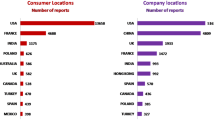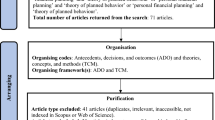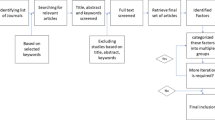Abstract
The objective of this research was to examine QR code payment acceptance during the COVID-19 outbreak in Thailand. A comprehensive research model answering QR code payment users’ intentional behavior was insufficient to some extent. Moreover, the recent pandemic crisis has increased the perceived susceptibility to COVID-19. To explore the behavioral intention during the unprecedented time more thoroughly, the technology acceptance model was extended with the subjective norm, facilitating conditions, personal innovativeness, perceived susceptibility, and perceived security. The data were collected from 384 QR payment users and the final sample was 377. The IBM SPSS Statistics and Amos programs version 28 have been utilized for data analysis. Besides, the structural equation modeling was applied to test the structural relationship and hypotheses. The results confirmed that perceived usefulness, facilitating conditions, personal innovativeness, and perceived security have a significant influence on the behavioral intention to use QR code payment. Notwithstanding, perceived ease of use, subjective norm, and perceived susceptibility had an insignificant impact on behavioral intention. The influence of perceived susceptibility on behavioral intention was rejected due to the users had a high familiarity and previous experience before the epidemic. This research paper practically contributed to the retail businesses, online applications and platforms, commercial banks and digital payment application providers, digital payment methods, and the Thailand government. Additionally, this study theoretically contributed to a saturated TAM theory with the essential determinants.

Similar content being viewed by others
Data availability
Data is unavailable due to privacy or ethical restrictions.
References
Agarwal, R., & Prasad, J. (1998). A conceptual and operational definition of information technology. Information Systems Research, 9(2), 204–215.
Ajzen, I. (1991). The theory of planned behavior. Organizational Behavior and Human Decision Processes, 50(2), 179–211. https://doi.org/10.1016/0749-5978(91)90020-T.
Anderson, J. C., & Gerbing, D. W. (1988). Structural equation modeling in practice: A review and recommended two-step approach. Psychological Bulletin, 103(3), 411–423. https://doi.org/10.1037/0033-2909.103.3.411.
Atkinson, L. (2013). Smart shoppers? Using QR codes and green smartphone apps to mobilize sustainable consumption in the retail environment. International Journal of Consumer Studies, 37(4), 387–393. https://doi.org/10.1111/ijcs.12025.
Bank of Thailand (2023). Bank of Thailand: Annual Report 2022. https://www.bot.or.th/content/dam/bot/documents/en/research-and-publications/reports/annual-report/AnnualReport2022.pdf.html.
Bank of Thailand (2022). Bank of Thailand: Annual Report 2021. https://www.bot.or.th/English/ResearchAndPublications/Report/DocLib_AnnualEconReport/AnnualReport2021_En.pdf.
Bank of Thailand (2019). Payment systems report 2019 (Issue 4). https://www.bot.or.th/English/PaymentSystems/Publication/PS_Annually_Report/Documents/Payment_2019_E.pdf.
Bentler, P. M., & Chou, C. P. (1987). Practical issues in structural modeling. Sociological Methods & Research, 16(1), 78–117. https://doi.org/10.1177/0049124187016001004.
Buhi, E. R., Goodson, P., & Neilands, T. B. (2007). Structural equation modeling: A primer for health behavior researchers. American Journal of Health Behavior, 31(1), 74–85. https://doi.org/10.5993/AJHB.31.1.8.
Cauberghe, V., De Pelsmacker, P., Janssens, W., & Dens, N. (2009). Fear, threat and efficacy in threat appeals: Message involvement as a key mediator to message acceptance. Accident Analysis & Prevention, 41(2), 276–285. https://doi.org/10.1016/j.aap.2008.11.006.
Cohen, J. (1988). Statistical Power Analysis for the behavioral sciences (2nd ed.). Lawrence Erlbaum Associates, Publishers. https://www.utstat.toronto.edu/~brunner/oldclass/378f16/readings/CohenPower.pdf.
Conner, M., & Norman, P. (2006). Predicting health behaviour: Research and practice with social congnition model. Open University Press (2nd ed.). Bell & Bain Ltd.
Davis, F. D. (1989). Perceived usefulness, perceived ease of use, and user acceptance of information technology. MIS Quarterly, 13(3), 319. https://doi.org/10.2307/249008.
Dzogbenuku, R. K., Amoako, G. K., Kumi, D. K., & Bonsu, G. A. (2022). Digital payments and financial wellbeing of the rural poor: The moderating role of age and gender. Journal of International Consumer Marketing, 34(2), 113–136. https://doi.org/10.1080/08961530.2021.1917468.
Fornell, C., & Larcker, D. F. (1981). Evaluating structural equation models with unobservable variables and measurement error. Journal of Marketing Research, 18(1), 39–50.
Glanz, K., Rimer, B., & Viswanath, K. (2002). Health behavior and health education: Theory, research, and practice (4th ed.). Jossey-Bass.
Hair, J. F., Black, W. C., Babin, B. J., & Anderson, R. E. (2013). Multivariate data analysis: Pearson new international edition (7th ed.). Pearson Education Limited.
Hair, J. F. Jr., Hult, G. T. M., Ringle, C., & Sarstedt, M. (2016). A primer on partial least squares structural equation modeling (PLS-SEM). Sage Publications, Inc.
Joshi, A., Kale, S., Chandel, S., & Pal, D. (2015). Likert scale: Explored and explained. British Journal of Applied Science & Technology, 7(4), 396–403. https://doi.org/10.9734/bjast/2015/14975.
Kulshreshtha, K., Tripathi, V., Bajpai, N., & Dubey, P. (2017). Discriminating market segments using preferential green shift: A conjoint approach. Foresight, 19(4), 386–408. https://doi.org/10.1108/FS-02-2017-0007.
Lara-Rubio, J., Villarejo-Ramos, A. F., & Liébana-Cabanillas, F. (2021). Explanatory and predictive model of the adoption of P2P payment systems. Behaviour & Information Technology, 40(6), 528–541. https://doi.org/10.1080/0144929X.2019.1706637.
Le, X. C. (2021). The diffusion of mobile QR-code payment: An empirical evaluation for a pandemic. Asia-Pacific Journal of Business Administration. https://doi.org/10.1108/APJBA-07-2021-0329.
Liébana-Cabanillas, F., de Luna, R., I., & Montoro-Ríos, F. J. (2015). User behaviour in QR mobile payment system: The QR payment acceptance model. Technology Analysis and Strategic Management, 27(9), 1031–1049. https://doi.org/10.1080/09537325.2015.1047757.
Lin, W. R., Lin, C. Y., & Ding, Y. H. (2020). Factors affecting the behavioral intention to adopt mobile payment: An empirical study in Taiwan. Mathematics, 8(10), 1851. https://doi.org/10.3390/math8101851.
Lou, L., Tian, Z., & Koh, J. (2017). Tourist satisfaction enhancement using mobile QR code payment: An empirical investigation. Sustainability (Switzerland), 9(7), 1–14. https://doi.org/10.3390/su9071186.
Luarn, P., & Lin, H. H. (2005). Toward an understanding of the behavioral intention to use mobile banking. Computers in Human Behavior, 21(6), 873–891. https://doi.org/10.1016/j.chb.2004.03.003.
Makhoul, J. (1975). Linear prediction: A tutorial review. Proceedings of the IEEE, 63(4), 561–580. https://doi.org/10.1109/PROC.1975.9792.
Merhi, M., Hone, K., Tarhini, A., & Ameen, N. (2021). An empirical examination of the moderating role of age and gender in consumer mobile banking use: A cross-national, quantitative study. Journal of Enterprise Information Management, 34(4), 1144–1168. https://doi.org/10.1108/JEIM-03-2020-0092.
Migliore, G., Wagner, R., Cechella, F. S., & Liébana-Cabanillas, F. (2022). Antecedents to the adoption of mobile payment in China and Italy: An integration of UTAUT2 and innovation resistance theory. Information Systems Frontiers, 24(6), 2099–2122. https://doi.org/10.1007/s10796-021-10237-2.
National Statistical Office of Thailand (2020). The 2000 population and housing census. Ministry of Information and Communication Technology. http://web.nso.go.th/en/census/poph/finalrep_e.htm.
O’Brien, R. M. (2007). A caution regarding rules of thumb for variance inflation factors. Quality & Quantity, 41(5), 673–690. https://doi.org/10.1007/s11135-006-9018-6.
Oliveira, T., Thomas, M., Baptista, G., & Campos, F. (2016). Mobile payment: Understanding the determinants of customer adoption and intention to recommend the technology. Computers in Human Behavior, 61(2016), 404–414. https://doi.org/10.1016/j.chb.2016.03.030.
Parasuraman, A., Zeithaml, V. A., & Malhotra, A. (2005). E-S-QUAL: A multiple-item scale for assessing electronic service quality. Journal of Service Research, 7(3), 213–233. https://doi.org/10.1177/1094670504271156.
Patil, P., Tamilmani, K., Rana, N. P., & Raghavan, V. (2020). Understanding consumer adoption of mobile payment in India: Extending Meta-UTAUT model with personal innovativeness, anxiety, trust, and grievance redressal. International Journal of Information Management, 54(May), 1–16. https://doi.org/10.1016/j.ijinfomgt.2020.102144.
Podsakoff, P. M., MacKenzie, S. B., Lee, J. Y., & Podsakoff, N. P. (2003). Common method biases in behavioral research: A critical review of the literature and recommended remedies. Journal of Applied Psychology, 88(5), 879–903. https://doi.org/10.1037/0021-9010.88.5.879.
Ponsree, K., Phongpaew, T., & Naruetharadhol, P. (2023). Study of Thai youths in the northeastern region of Thailand on the effectiveness of digital payment behavior. Journal of Promotion Management, 29(4), 569–605. https://doi.org/10.1080/10496491.2022.2163035.
Putri, A. F., Handayani, P. W., & Shihab, M. R. (2020). Environment factors affecting individual’s continuance usage of mobile payment technology in Indonesia. Cogent Engineering, 7(1), 1846832. https://doi.org/10.1080/23311916.2020.1846832.
Ramos-de-Luna, I., Montoro-Ríos, F., & Liébana-Cabanillas, F. (2016). Determinants of the intention to use NFC technology as a payment system: An acceptance model approach. Information Systems and E-Business Management, 14(2), 293–314. https://doi.org/10.1007/s10257-015-0284-5.
Ramos-de-Luna, I., Liébana-Cabanillas, F., Sánchez-Fernández, J., & Muñoz-Leiva, F. (2019). Mobile payment is not all the same: The adoption of mobile payment systems depending on the technology applied. Technological Forecasting and Social Change, 146(September 2018), 931–944. https://doi.org/10.1016/j.techfore.2018.09.018.
Rogers, E. M. (1995). Diffusion of innovations (4th ed.). Free Press.
Shin, D. H., Jung, J., & Chang, B. H. (2012). The psychology behind QR codes: User experience perspective. Computers in Human Behavior, 28(4), 1417–1426. https://doi.org/10.1016/j.chb.2012.03.004.
Silanoi, W., Naruetharadhol, P., & Ponsree, K. (2023). The confidence of and concern about using mobile banking among generation Z: A case of the post COVID-19 situation in Thailand. Social Sciences, 12(4), 198. https://doi.org/10.3390/socsci12040198.
Srisathan, W. A., & Naruetharadhol, P. (2022). A COVID-19 disruption: The great acceleration of digitally planned and transformed behaviors in Thailand. Technology in Society, 68, 101912. https://doi.org/10.1016/j.techsoc.2022.101912.
Tavera-Mesias, J. F., van Klyton, A., & Zuñiga Collazos, A. (2022). Social stratification, self-image congruence, and mobile banking in Colombian cities. Journal of International Consumer Marketing, 34(3), 312–331. https://doi.org/10.1080/08961530.2021.1955426.
The Secretariat of the Prime Minister. (2017). Thailand 4.0 driving the future towards stability, wealth, and sustainability. Thai Khu Fah Journal, 33, 1–44. www.thaigov.go.th.
Tu, M., Wu, L., Wan, H., Ding, Z., Guo, Z., & Chen, J. (2022). The adoption of QR code mobile payment technology during COVID-19: A social learning perspective. Frontiers in Psychology, 12(February), 1–10. https://doi.org/10.3389/fpsyg.2021.798199.
Türker, C., Altay, B. C., & Okumuş, A. (2022). Understanding user acceptance of QR code mobile payment systems in Turkey: An extended TAM. Technological Forecasting and Social Change, 184(January), 121968. https://doi.org/10.1016/j.techfore.2022.121968.
Ullman, J. B., & Bentler, P. M. (2003). Structural equation modeling. Handbook of psychology (pp. 607–634). John Wiley & Sons, Inc. https://doi.org/10.1002/0471264385.wei0224.
Venkatesh, V., Morris, M. G., Davis, G. B., & Davis, F. D. (2003). User acceptance of information technology: Toward a unified view. MIS Quarterly, 27(3), 425. https://doi.org/10.2307/30036540.
Vogt, W. P., & Johnson, R. B. (2015). The SAGE dictionary of statistics & methodology: A nontechnical guide for the social sciences. Sage publications.
Wagner Mainardes, E., de Almeida, C. M., & De-Oliveira, M. (2019). E-commerce: An analysis of the factors that antecede purchase intentions in an emerging market. Journal of International Consumer Marketing, 31(5), 447–468. https://doi.org/10.1080/08961530.2019.1605643.
Watson, C., McCarthy, J., & Rowley, J. (2013). Consumer attitudes towards mobile marketing in the smart phone era. International Journal of Information Management, 33(5), 840–849. https://doi.org/10.1016/j.ijinfomgt.2013.06.004.
West, S. G., Finch, J. F., & Curran, P. J. (1995). Structural equation models with nonnormal variables: Problems and remedies. Structural equation modeling: Concepts, issues, and applications (pp. 56–75). Sage Publications, Inc.
Yamane, T. (1967). Statistics, an introductory analysis (2nd ed.). Harper and Row.
Yan, L. Y., Tan, G. W. H., Loh, X. M., Hew, J. J., & Ooi, K. B. (2021). QR code and mobile payment: The disruptive forces in retail. Journal of Retailing and Consumer Services, 58(January 2020), 102300. https://doi.org/10.1016/j.jretconser.2020.102300.
Zhao, H., Anong, S. T., & Zhang, L. (2019). Understanding the impact of financial incentives on NFC mobile payment adoption. International Journal of Bank Marketing, 37(5), 1296–1312. https://doi.org/10.1108/IJBM-08-2018-0229.
Zhong, Y., & Moon, H. C. (2022). Investigating customer behavior of using contactless payment in China: A comparative study of facial recognition payment and mobile QR-code payment. Sustainability, 14(12), 7150. https://doi.org/10.3390/su14127150.
Author information
Authors and Affiliations
Corresponding author
Ethics declarations
Ethics approval
Khon Kaen University Ethics Committee for Human Research, Khon Kaen University, Khon Kaen, Thailand, has made an agreement that this study has met the criteria of the Exemption De-termination Regulations.
Informed consent
Each participant read and accepted the consent form before participation.
Conflict of interest
The authors declare no conflict of interest.
Additional information
Publisher’s Note
Springer Nature remains neutral with regard to jurisdictional claims in published maps and institutional affiliations.
Rights and permissions
Springer Nature or its licensor (e.g. a society or other partner) holds exclusive rights to this article under a publishing agreement with the author(s) or other rightsholder(s); author self-archiving of the accepted manuscript version of this article is solely governed by the terms of such publishing agreement and applicable law.
About this article
Cite this article
Ponsree, K. QR code payment in Thailand 4.0 era: expand the understanding of perceived susceptibility to COVID-19 in the TAM theory. Curr Psychol (2024). https://doi.org/10.1007/s12144-023-05605-x
Accepted:
Published:
DOI: https://doi.org/10.1007/s12144-023-05605-x




